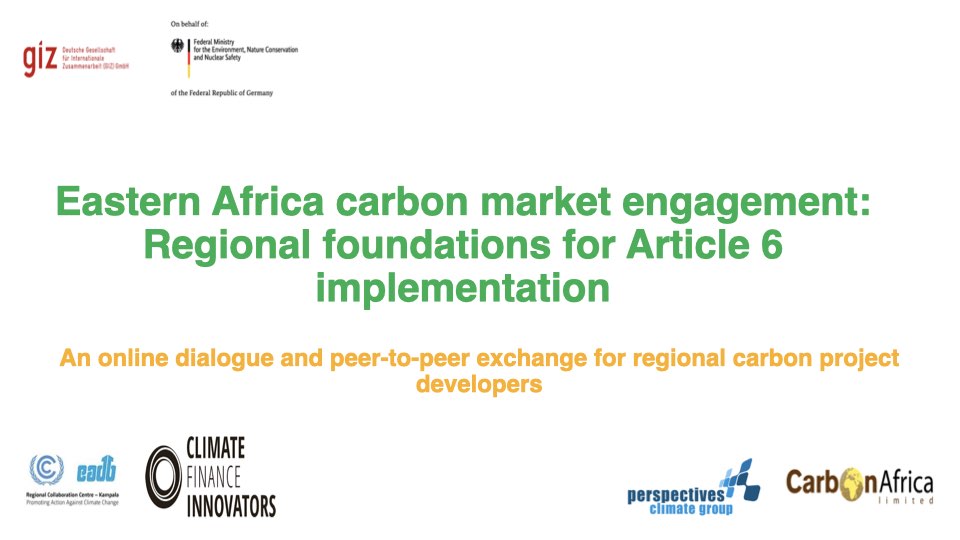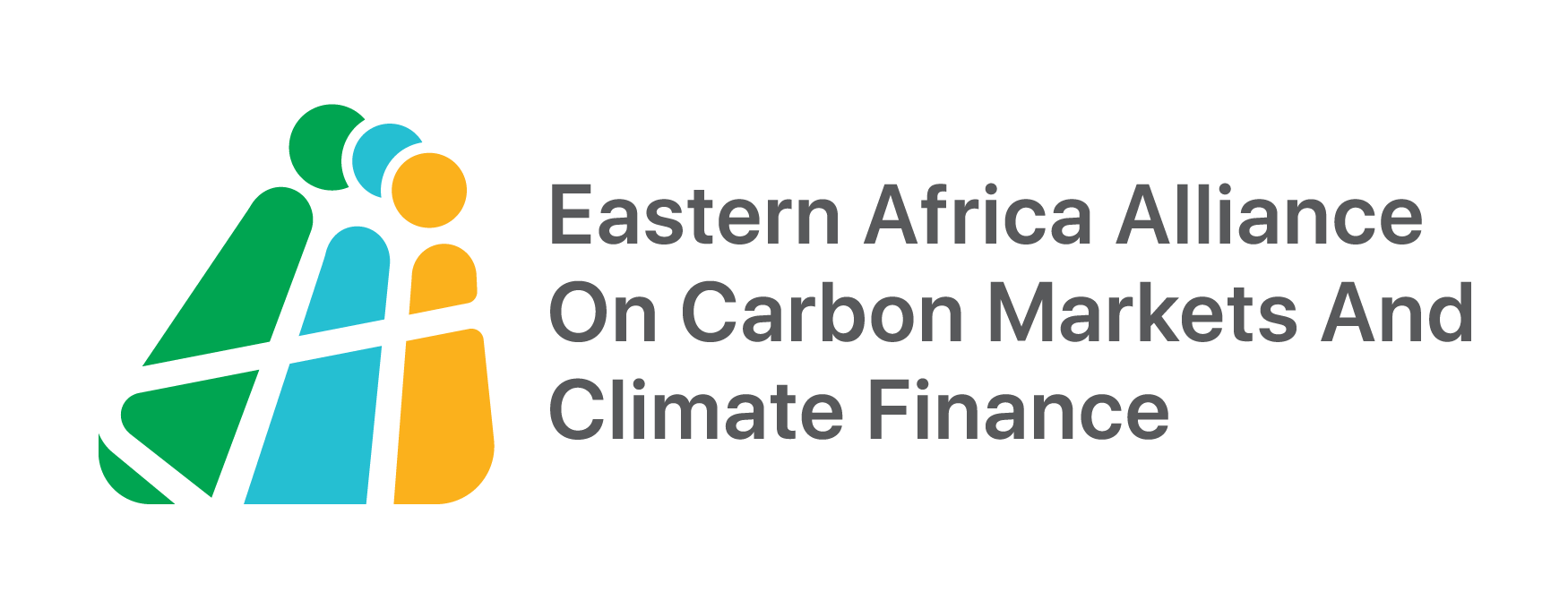Blog
Home > Non Profit > Eastern Africa carbon market engagement: Regional foundations for Article 6 implementation

08
AprBy: Adminalliance
Comments: 0
The Eastern Africa Alliance on Carbon Markets and Climate Finance with support from the GIZ Global Carbon Markets Programme, the UNFCCC Regional Collaboration Centre in Kampala, Carbon Africa and Perspectives Climate Group hosted a private sector series on carbon market engagement on the 21st, 23rd and 25th of September 2020.
The private sector is instrumental in ensuring the success of Article 6 activities in the Eastern African region once the guidance on cooperative approaches and the rules on the new mechanism come into play. They mobilise investment and bring in projects with new technologies contributing to low carbon and climate resilient development in these countries. Carbon market activities in the Eastern African region are not new as countries have already taken part in the Clean Development Mechanism (CDM) and voluntary carbon standards activities. Therefore, the main aim of the dialogues was to build readiness for the potential CDM transition and future implementation of Article 6 amongst existing and aspiring carbon asset developers.In addition to the developers the participants ranged from technical experts and development partners to financial institutions representatives.
The series commenced with a status update on international climate change negotiations on Article 6 by the UNFCCC Secretariat and a presentation on the road to COP 26 by the incoming Presidency represented by the UK Government. The session gave insight into how the decisions made at the international level can catalyse actions leading to real impact from the potential in the cooperative approaches to come. To understand where the region is going it was important for participants to understand where it was coming from. Climate Finance Innovators provided an overview of the Eastern Africa profile with statistics on CDM project and programme of activities (PoA) registrations, sectors, issuances as well as Gold Standard and Verra activity. It highlighted what was at stake as the region moves in implementation of Article 6.
Regarding the existing portfolio the topic on transition was a core issue. The UNFCCC gave insights on the different aspects of transition of infrastructure, activities and units with Perspectives Consulting Group providing a presentation on the same from an independent technical expert view. Despite the existing optimism of project developers , regardingincoming Article 6 rules, there is a need for clarity on transition for existing assets. The uncertainty related to Article 6 is currently impacting business operations and is raising questions, for example on whether to undertake verification audits, or making decisions on further investment.
The second session had a significant focus on key features of Nationally Determine Contributions (NDCs) and the relation to carbon market activities. Participants were taken through the NDC processes in such as the NDC updates to be submitted by 2020 and every 5 years. As governments will be tracking and reporting on NDC activities there will need for clarity on the role and responsibilities of government and private sector regarding the transfer of ITMOs in relation to NDC implementation.
As countries agreed at the negotiations to apply corresponding adjustments to avoid double counting, the session further explored the concept, its relevance to tracking and reporting as well as the associated risks. Governments in the region, that will be hosting activities, need to plan carefully what amount of units are to be transferred internationally or used domestically towards the NDC so as not to overshoot their target and ensure they can report on Article 6 activities transparently. For this institutional frameworks and infrastructure, such as registries, are required. With the incoming of NDCs, which were not present under the Kyoto Protocol, there is further work to be done in revisiting concepts such as additionality.
The sessions were followed by a panel of distinguished speakers from the voluntary carbon market (VCM) space, such as Verra and Gold Standard, together with project developer voices, PD Forum and ClimateCare. They took participants into a rich on recent VCM developments, actions towards corresponding adjustments and views on transition. Participants were reminded on the need of speeding up climate action through scaling activities with both the standards and the project developers noting significant increased demand from corporates for emission reduction units and their services. The ongoing Article 6 negotiations and developments led to in depth discussion on whether corresponding adjustments are required or not and how labelling options for units, for example as Article 6 compliant, are being developed. The line between voluntary and compliance standards is also changing and is not so clearly defined, with voluntary standards being used in domestic compliance markets and CORSIA making transparency even more important. It was also important to ensure there be a balance with regulation implemented to ensure years of building cooperate support for lowering emissions is not jeopardised.
As the series drew to a close the last session focused on piloting Article 6 which has already commenced in several African countries. These activities can not only be viewed as a source of investment into the country but also have the units as an export product. There is a movement to upscaling activities and the need for policies to drive this. The private sector provides good businesses cases for proposed projects and undertake risk assessments. These are some of the factors the Swiss the KliK foundation look for in private sector engagement with their activities in Africa already covering Ghana, Senegal, Morocco with strong interest from Uganda and Kenya. It was expressed that they were very close to finalising a bilateral agreement with Peru that would provide a real case on matters corresponding adjustments and sustainable development.Furthermore, they were open to building on existing activities therefore upscaling of PoAs was welcome, providing an option to developers in the region.
On a policy level the Gold Standard has been advocating for sustainable development practices and application of best practices in Article 6 piloting. Currently they are developing an additionality framework for cooperative approaches leading to ambitious sustainable development outcomes and reducing the risk of seller countries overselling. It was noted that several Interministerial committees are already in place in different African countries indicating countries are actively preparing for Article 6 implementation. The representative from the South African government took participants through the process of establishing South Africa’s carbon tax. The design of the tax allows for use of offsets that provided a 5-10% tax liability relief, acting as an initial incentive to be ramped up over time. Eligible Offsets can be derived from CDM, gold standard and Verra projects developed in South Africa as these already have well established methodologies to provide an incentive in the beginning and the tax ramped up later in time.
This series provided participants with the latest information on carbon market developments and the opportunity to interact with the industry’s leading experts. The Alliance would like to thank the distinguished speakers from the UNFCCC Secretariat, the UK Government, Perspectives, Climate Finance Innovators, Verra, Gold Standard, PD Forum, ClimateCare, The KliK Foundation and the South African Government for contributing to the series.
Please find the presentations here
Sidebar

